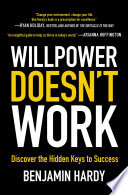

One of the central tenets of 'Willpower Doesn't Work' is that our environment plays a crucial role in shaping our behaviors and decisions. The author, Benjamin Hardy, argues that relying solely on willpower to change habits or achieve goals is misguided. Instead, he emphasizes the importance of designing an environment that supports desired behaviors. For instance, if someone wants to eat healthier, they should surround themselves with healthy food options and remove junk food from their home. This idea extends beyond physical environments to include social circles and digital spaces. By curating our surroundings, we can create a more conducive atmosphere for success, minimizing the reliance on willpower, which can be easily depleted.
Continue readingHardy suggests that instead of fixating on specific goals, individuals should concentrate on the systems and processes that lead to those goals. Goals can be useful for setting direction, but they can also create pressure and lead to feelings of failure if not achieved. A system, on the other hand, is a set of practices and habits that can be maintained over time, leading to sustainable progress. For example, a writer might set a goal to finish a novel but would benefit more from establishing a daily writing routine. By focusing on systems, individuals can create a more resilient approach to personal and professional development, one that is less susceptible to the ups and downs of motivation.
Continue readingHardy emphasizes the importance of identity in shaping behavior. Instead of merely trying to change actions or habits, he advocates for a shift in identity. When individuals see themselves as a certain type of person—such as a healthy eater or a dedicated writer—they are more likely to engage in behaviors that align with that identity. This concept ties into the idea of self-perception and how it influences our choices. By adopting an identity that reflects our desired outcomes, we can create intrinsic motivation that drives us toward our goals. This idea encourages readers to redefine how they view themselves and to align their actions with their new self-concept.
Continue readingHardy argues that the people we surround ourselves with significantly impact our behaviors and decisions. Our social environment can either uplift us or drag us down. Building a community of supportive individuals who share similar goals can create a positive feedback loop that fosters growth and accountability. Conversely, being around negative influences can lead to self-sabotage. This idea highlights the importance of choosing relationships that encourage personal development. It also suggests that individuals should seek out mentors and peers who inspire them to reach their full potential, reinforcing the notion that we are often a reflection of those we spend the most time with.
Continue readingMindfulness plays a critical role in Hardy's framework for personal development. By cultivating awareness of our thoughts, emotions, and behaviors, we can make more intentional choices rather than reacting impulsively. Mindfulness allows individuals to step back from their automatic responses, creating space for reflection and conscious decision-making. This heightened awareness can lead to better self-regulation and the ability to navigate challenges more effectively. Hardy encourages readers to practice mindfulness techniques such as meditation, journaling, or simply taking time to reflect on their day, which can enhance their ability to stay aligned with their goals.
Continue readingHardy emphasizes that having a clear sense of purpose is essential for sustained motivation and resilience. When individuals understand why they are pursuing specific goals, they are more likely to stay committed, even in the face of obstacles. Purpose acts as a guiding star, helping individuals navigate challenges and maintain focus. Hardy encourages readers to explore their values and passions to uncover their deeper motivations. By connecting actions to a greater purpose, individuals can cultivate a sense of fulfillment that transcends temporary setbacks, reinforcing the idea that willpower alone is insufficient without a compelling reason to act.
Continue readingThe final idea presented by Hardy is the necessity of adaptability in achieving success. Life is unpredictable, and rigid plans can lead to frustration when things don’t go as expected. Hardy advocates for a flexible approach to personal development, allowing individuals to adjust their strategies and systems as needed. This adaptability not only helps in overcoming obstacles but also fosters resilience and creativity. By embracing change and being open to new possibilities, individuals can navigate their journeys more effectively, ensuring that they remain aligned with their goals even when faced with challenges.
Continue readingThe reading time for Willpower Doesn't Work depends on the reader's pace. However, this concise book summary covers the 7 key ideas from Willpower Doesn't Work, allowing you to quickly understand the main concepts, insights, and practical applications in around 21 min.
Willpower Doesn't Work is definitely worth reading. The book covers essential topics including Environment Shapes Behavior, Focus on Systems, Not Goals, Identity-Based Change, providing practical insights and actionable advice. Whether you read the full book or our concise summary, Willpower Doesn't Work delivers valuable knowledge that can help you improve your understanding and apply these concepts in your personal or professional life.
Willpower Doesn't Work was written by Benjamin Hardy.
If you enjoyed Willpower Doesn't Work by Benjamin Hardy and want to explore similar topics or deepen your understanding, we highly recommend these related book summaries:
These books cover related themes, complementary concepts, and will help you build upon the knowledge gained from Willpower Doesn't Work. Each of these summaries provides concise insights that can further enhance your understanding and practical application of the ideas presented in Willpower Doesn't Work.